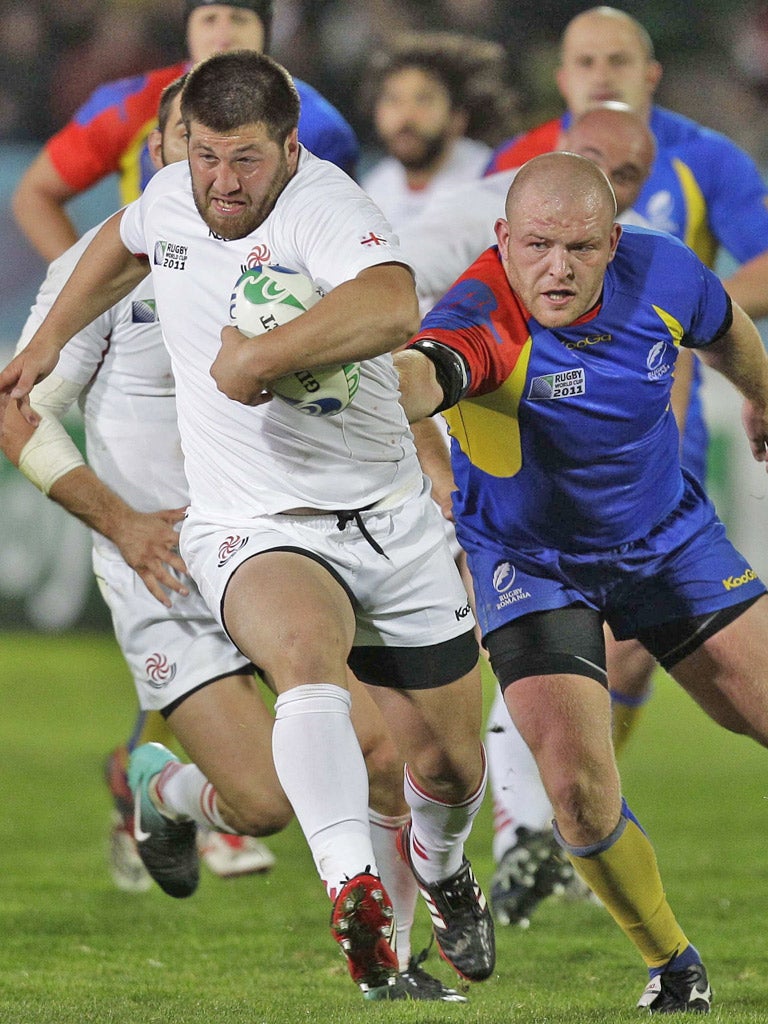'Minnows' swim for home with heads held high
Developing nations would make even greater strides if broadcasters' influence on fixture list was lessened

And so the minnows swim for home. Namibia, beasted by 80-plus points for the second time in less than 96 hours, left these shores on Tuesday, having somehow emerged from the shallow graves in which they were confined at the end of their final pool match with Wales. Johan Diergaardt, their coach, returns to his day job as a building contractor in Windhoek this very morning. Jacques Burger, their astonishing captain, says he hopes to have a couple of weeks rest and recuperation before returning to Premiership duties with Saracens. Knowing his luck, Sarries will give him a run-out with the second team on Monday night.
With the Romanians, Japanese and Americans also on the way back to their loved ones, there are now only two matches on the fixture list carrying serious health warnings: the Wallabies play Russia in beautiful Nelson on Saturday; the All Blacks will set about Canada on Sunday. After that, no more mismatches – unless, of course, Ma'a Nonu and Israel Dagg really catch fire and smithereen their quarter-final opponents all over the North Island.
On the evidence of the matches played in the first half of the pool phase, the so-called "smaller" or "developing" nations – other supremely patronising terms have been used, but we'll stick with these for brevity's sake – were more competitive than at any time since the 1991 competition, with margins in matches between the eight foundation unions (the four home countries, the three SANZAR teams and France) and the rest averaging out at 26 points. Then, the worst injustices of the fixture programme kicked in. A series of four-day turnarounds, largely the result of broadcasting demands, forced the likes of Romania and the United States to name understrength teams against the very best opposition in an attempt to keep leading players fresh for games that might be won.
Flabbergastingly, a number of television pundits, some of whom should have known much better, attacked the Romanian coach Romeo Gontineac, among others, for showing "disrespect" – an argument that would have been impossible to understand, but for the fact that it was made by paid representatives of the people who caused the problem in the first place. Namibia, by some distance the most poorly-resourced side in the competition, played four games between mid-afternoon on 10 September and early evening on 26 September. If Amnesty International ever investigates this, its report will be well worth reading.
Once the coaches decided to prioritise games in which victory was feasible above those in which it was out of the question, the consequences were inevitable: the 26-point average jumped to 36 points. Suddenly, the tournament became more lopsided than most previous World Cups, although it is still nowhere near as bad as the "lambs to the slaughter" competition in 2003.
Yet when all the imbalances and iniquities are taken into account, it is clear that a number of the tier-two nations are significantly better than they were in France four years ago. Georgia, Canada, the USA and Japan have been more competitive for longer; Romania, beset by their own particular financial issues, might have beaten Scotland on the opening weekend; Russia, in their first World Cup, may cop it from the Wallabies this weekend, but will still leave with strengthened foundations in place.
These countries, along with Fiji and Namibia, began the tournament outside the top dozen in the official rankings. The Pacific Islanders cannot be classed as "minnows": as recently as four years ago, they were very big fish indeed. The others? For what it is worth, here is their team of the tournament.
MINNOWS TEAM OF THE TOURNAMENT
10. J Arlidge (Jap)
11. P Mackenzie (Can)
12. P Emerick (US)
13. D van Wyk (Nam)
14. V Artemyev (Rus)
15. C Wyles (US)
1. M MacDonald (US)
2. M Tincu (Rom)
3. P Ion (Rom)
4. J Sinclair (Can)
5. H Smith (US)
6. J Burger (Nam)
7. M Gorgodze (Geo)
8. D Basilaia (Geo)
9. I Abuseridze (Geo)
Join our commenting forum
Join thought-provoking conversations, follow other Independent readers and see their replies
Comments
Bookmark popover
Removed from bookmarks